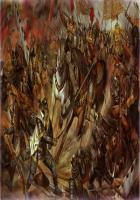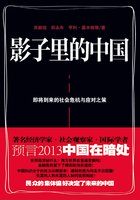Even party regularity could not long endure such tyranny.It was not against party organization that the insurgents finally raised their lances, but against the arbitrary use of the machinery of the organization by a small group of intrenched "standpatters."The revolt began during the debate on the Payne-Aldrich tariff, and in the campaign of 1908 "Cannonism" was denounced from the stump in every part of the country.By March, 1910, the insurgents were able, with the aid of the Democrats, to amend the rules, increasing the Committee on Rules to ten to be elected by the House and making the Speaker ineligible for membership.When the Democrats secured control of the House in the following year, the rules were revised, and the selection of all committees is now determined by a Committee on Committees chosen in party caucus.This change shifts arbitrary power from the shoulders of the Speaker to the shoulders of the party chieftains.The power of the Speaker has been lessened but by no means destroyed.He is still the party chanticleer.
The political power of the House, however, cannot be calculated without admitting to the equation the Senate, the third official unit, and, indeed, the most powerful factor in the national hierarchy.The Senate shares equally with the House the responsibility of lawmaking, and shares with the President the responsibility of appointments and of treaty-making.It has been the scene of many memorable contests with the President for political control.The senators are elder statesmen, who have passed through the refining fires of experience, either in law, business, or politics.A senator is elected for six years; so that he has a period of rest between elections, in which he may forget his constituents in the ardor of his duties.
Within the last few decades a great change has come over the Senate, over its membership, its attitude towards public questions, and its relation to the electorate.This has been brought about through disclosures tending to show the relations on the part of some senators towards "big business." As early as the Granger revelations of railway machinations in politics, in the seventies, a popular distrust of the Senate became pronounced.No suggestion of corruption was implied, but certain senators were known as "railway senators," and were believed to use their partizan influence in their friends' behalf.This feeling increased from year to year, until what was long suspected came suddenly to light, through an entirely unexpected agency.William Randolph Hearst, a newspaper owner who had in vain attempted to secure a nomination for President by the Democrats and to get himself elected Governor of New York, had organized and financed a party of his own, the Independence League.While speaking in behalf of his party, in the fall of 1908, he read extracts from letters written by an official of the Standard Oil Company to various senators.The letters, it later appeared, had been purloined from the Company's files by a faithless employee.They caused a tremendous sensation.The public mind had become so sensitive that the mere fact that an intimacy existed between the most notorious of trusts and some few United States senators--the correspondents called each other "Dear John," "Dear Senator," etc.--was sufficient to arouse the general wrath.The letters disclosed a keen interest on the part of the corporation in the details of legislation, and the public promptly took the Standard Oil Company as a type.They believed, without demanding tangible proof, that other great corporations were, in some sinister manner, influencing legislation.
Railroads, insurance companies, great banking concerns, vast industrial corporations, were associated in the public mind as "the Interests." And the United States Senate was deemed the stronghold of the interests.A saturnalia of senatorial muckraking now laid bare the "oligarchy," as the small group of powerful veteran Senators who controlled the senatorial machinery was called.It was disclosed that the centralization of leadership in the Senate coincided with the centralization of power in the Democratic and Republican national machines.In 1911and 1912 a "money trust" investigation was conducted by the Senate and a comfortable entente was revealed between a group of bankers, insurance companies, manufacturers, and other interests, carried on through an elaborate system of interlocking directorates.Finally, in 1912, the Senate ordered its Committee on Privileges and Elections to investigate campaign contributions paid to the national campaign committees in 1904, 1908, and 1912.
The testimony taken before this committee supplied the country with authentic data of the interrelations of Big Business and Big Politics.
The revolt against "Cannonism" in the House had its counterpart in the Senate.By the time the Aldrich tariff bill came to a vote (1909), about ten Republican senators rebelled.The revolt gathered momentum and culminated in 1912 in the organization of the National Progressive party with Theodore Roosevelt as its candidate for President and Hiram Johnson of California for Vice-President.The majority of the Progressives returned to the Republican fold in 1916.But the rupture was not healed, and the Democrats reelected Woodrow Wilson.















